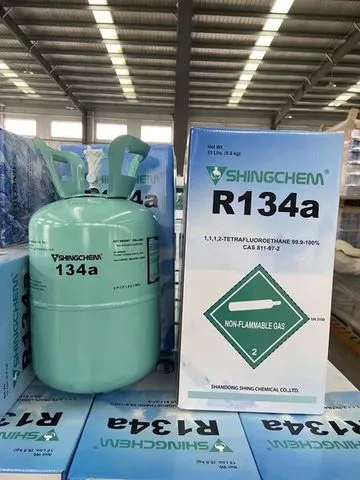Description
What is Refrigerant Gas?
Refrigerant gas is a chemical compound used in cooling systems to absorb heat and release it elsewhere, allowing refrigeration and air conditioning systems to function efficiently. Refrigerants are crucial for applications such as air conditioning (AC), refrigeration, industrial cooling, and heat pumps.
Types of Refrigerant Gases
Refrigerants are categorized based on their chemical composition and environmental impact. Below are the major types:
1. Chlorofluorocarbons (CFCs) – Phased Out
Example: R-12 (Dichlorodifluoromethane)
Environmental Impact: High ozone depletion potential (ODP) and high global warming potential (GWP)
Phase-Out: Banned under the Montreal Protocol due to its harmful effects on the ozone layer.
2. Hydrochlorofluorocarbons (HCFCs) – Phasing Out
Example: R-22 (Chlorodifluoromethane)
Environmental Impact: Lower ozone depletion potential than CFCs but still harmful.
Phase-Out: Being replaced with environmentally friendly alternatives in many countries.
3. Hydrofluorocarbons (HFCs) – Widely Used but Being Phased Down
Examples:
R-134a (Common in automotive AC and refrigeration)
R-404A, R-410A (Used in commercial refrigeration and residential AC)
Environmental Impact: No ozone depletion, but high GWP.
Phase-Down: Many HFCs are being replaced due to their contribution to global warming.
4. Hydrofluoroolefins (HFOs) – Eco-Friendly Alternatives
Examples:
R-1234yf (Replacement for R-134a in automotive AC)
R-1234ze (Used in chillers and refrigeration)
Environmental Impact: Low GWP, no ozone depletion.
Usage: Preferred for modern AC and refrigeration systems.
5. Natural Refrigerants – Sustainable & Environmentally Friendly
Examples:
Ammonia (R-717) – Used in industrial refrigeration, energy-efficient but toxic.
Carbon Dioxide (R-744) – Used in supermarkets and industrial cooling, non-toxic, and low GWP.
Propane (R-290) & Isobutane (R-600a) – Used in residential refrigerators and freezers.
Environmental Impact: Very low GWP, no ozone depletion, and highly efficient.
How Refrigerants Work in Cooling Systems
Compression: The refrigerant gas is compressed, raising its temperature and pressure.
Condensation: The hot gas releases heat and turns into a high-pressure liquid.
Expansion: The liquid refrigerant expands, reducing its temperature and pressure.
Evaporation: The cold refrigerant absorbs heat from the surrounding air, cooling the environment.
Cycle Repeats: This continuous process enables cooling in refrigerators, air conditioners, and other systems.
Refrigerant Regulations & Environmental Concerns
Montreal Protocol (1987): Banned CFCs and set phase-out schedules for HCFCs.
Kigali Amendment (2016): Aims to reduce HFC use due to their high GWP.
EU F-Gas Regulation: Limits the use of high-GWP refrigerants in Europe.
U.S. EPA SNAP Program: Encourages the transition to eco-friendly refrigerants.
Choosing the Right Refrigerant
When selecting a refrigerant, consider:
Cooling efficiency & performance
Environmental impact (GWP & ODP)
Safety (flammability & toxicity)
System compatibility
Regulatory compliance
Conclusion
Refrigerant gases play a crucial role in modern cooling systems, but environmental concerns are driving a shift toward eco-friendly alternatives. As regulations evolve, businesses and consumers must adapt to new, sustainable refrigerant technologies.
- R-134a Refrigerant Gas
- R-404A
- R-410A Refrigerant Gas
- Refrigerant Gas
- R-1234yf Refrigerant Gas
Production Capacity:
Not informed
Delivery Timeframe:
Not informed
Incoterms:
Not informedPackaging Details:
Not informed
More about
Razon Import & Export Co.,Ltd.
500-1000
Employees
2M - 10M
Sales volume (USD)
100%
% Export sales
Year
Established
Business type
- Industry / Manufacturer
- Importer / Trading Company
- Distributor / Wholesaler
- Retailer
Keywords
- Refrigerant gas
- dermal fillers
- peptides
- Food & Beverages
- Industrial & Manufacturing Supplies
- Pet Supplies
- Energy & Power Equipment
- Agricultural Products Ver Mais
Contact and location
-
Nawaporn ********
-
+66 9********
-
Mueang Chaiyaphum / Chaiyaphum | Thailand






